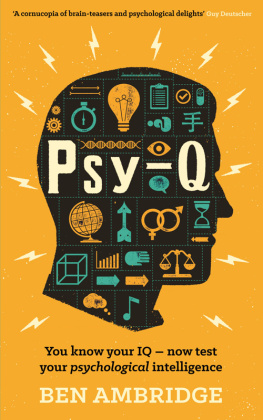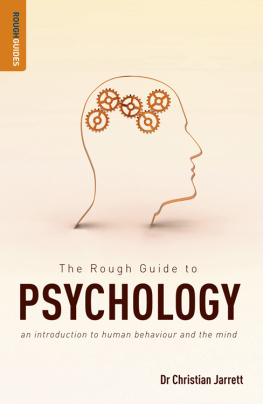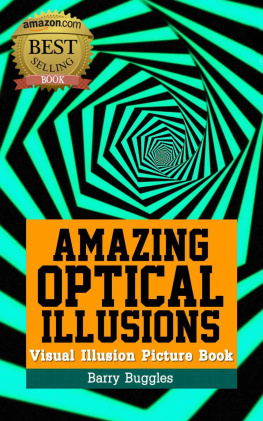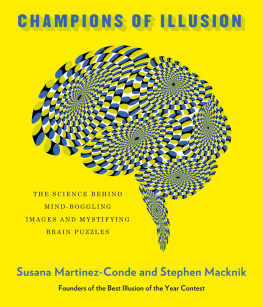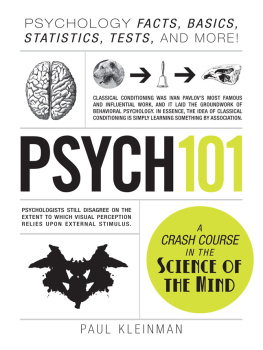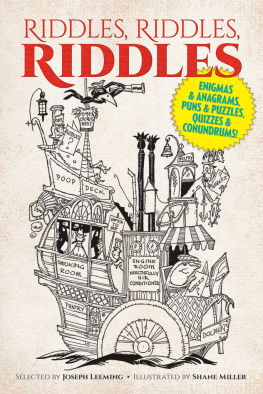Psy-Q
Ben Ambridge is Senior Lecturer in Psychology at the University of Liverpool. His article Why Cant We Talk to the Animals? was shortlisted for the 2012 Guardian-Wellcome Science Writing Prize. Psy-Q is his first book for a general audience.
Psy-Q
Test Your Psychological Intelligence
BEN AMBRIDGE

First published in Great Britain in 2014 by
PROFILE BOOKS LTD
3A Exmouth House
Pine Street
London EC1R OJH
www.profilebooks.com
Copyright Ben Ambridge, 2014
The moral right of the author has been asserted.
All rights reserved. Without limiting the rights under copyright reserved above, no part of this publication may be reproduced, stored or introduced into a retrieval system, or transmitted, in any form or by any means (electronic, mechanical, photocopying, recording or otherwise), without the prior written permission of both the copyright owner and the publisher of this book.
A CIP catalogue record for this book is available from the British Library.
eISBN 978 1 78283 0238
Acknowledgements
I would like to thank Daniel Crewe, Nick Sheerin and Penny Daniel at Profile, Melanie Tortoroli at Penguin, Sally Holloway at Felicity Bryan Associates for their extremely helpful guidance, comments and suggestions, Matthew Taylor for copy-editing and Nicky Barneby for design and typesetting.
Preface: Psychology Is Everything
Youve heard of your IQ; your general intelligence. But whats your Psy-Q? How much do you know and understand about what makes you tick? And how good are you at predicting other peoples behaviour or even your own?
The aim of this book is to share the answers that psychology has come up with to explain how and why humans do all the things we do. But it is not some dry, dusty psychology textbook, filled as most are with details of long, boring experiments and byzantine theories. What you want to know is what psychology can tell you about you and your life. Well, Im not going to tell you. Instead, Im going to show you, via a series of interactive tests, quizzes, puzzles, games and illusions. Of course, we dont have everything figured out right now. But by the time you reach the end of this book, you will not only have the very best answers that science can offer, but will also have gained a powerful insight into your own psychology.
Notice that I used the word science. As a psychology researcher, Im first and foremost a scientist. Psychology derives its value from following the scientific method: we come up with theories and test them, using the most controlled experiments possible. Every study that we meet over the course of this book is drawn from the peer-reviewed scientific literature. And while scientists rarely reach a consensus on anything, the explanations and conclusions I give are based on my reading of the best evidence that is currently available, with no wild conjecture, no pseudo-science and absolutely no pop-psychology pap. So, while youll encounter both cutting-edge studies and plenty of classics, there are very few from the period before psychology established itself as an experimental science, somewhere in the 1950s.
But Psy-Q doesnt just describe these studies; it is these studies. Youll measure your personality, intelligence, moral values, thinking style, impulsivity, skill at drawing, capacity for logical reasoning, musical taste, multitasking ability, susceptibility to illusions (both visual and mental) and preferences in a romantic partner. Youll learn how we as a species think, feel, see and respond to others. Youll be surprised, delighted, amazed, amused, frustrated, horrified and downright baffled. Youll turn psychologist and ask friends and family to complete the studies in order to compare your results. Youll run to your computer to complete online versions of the studies, many at the companion website (www.Psy-Qbook.com). And by the end of your journey, I hope youll have begun to see that psychology is everything: there is literally no aspect of the human experience that cannot be investigated, in some way or other, using the methods of experimental psychology.
As for the route that you take through the book, well, its up to you. Although Ive tried to put these studies in some kind of logical order, mixing up sections of different types to keep things lively, feel free to navigate your own path between cross-referenced studies or to float around at random as the mood takes you; its your book, your brain and your voyage of discovery. So, anchors away, lets set sail on your very own psych-odyssey.
The Raw Shark Test 3
Lets start with what is almost certainly the most famous psychological test ever: the Rorschach Test. To complete the test, simply write what you see in the space below each image, then turn the page to find out what your answers say about you.
1. 
___________________________
2. 
___________________________
3. 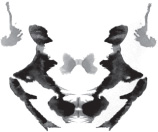
___________________________
4. 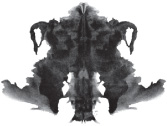
___________________________
5. 
___________________________
6. 
___________________________
7. 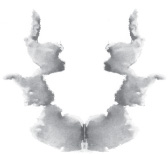
___________________________
8. 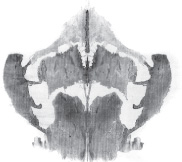
___________________________
9. 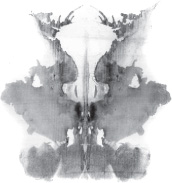
___________________________
10. 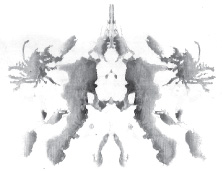
___________________________
ANSWERS
- The first card is really just a warm-up, and has fairly obvious responses that dont actually say anything much about you. Is it a bat, a butterfly or a moth? It doesnt matter.
- Now were getting into it. Most people will say that this looks like two humans, or animals such as bears or elephants. But do you think theyre fighting, holding hands or simply saying hello? If you said the former, this may indicate that you have angry or aggressive tendencies.
- This one definitely looks like two humans, right (perhaps with love hearts or butterflies in between them)? If you didnt spot them, or took a long time to do so, this suggests that you may struggle with social interactions.
- This card is often referred to as the father card, because whatever you say about it reflects your attitude towards your father. For example, if you saw a bear coming to devour you, youre probably a bit afraid of your father (or all men, or authority figures more generally).
- This is another easy card, designed to give you a break, and to check that youre paying attention and not giving completely off-the-wall answers. If you didnt say something like moth, butterfly or bat (or the Donnie Darko rabbit), youve got issues.
- Number six is a sex card. Oh, come on, use your imagination! If you said animal skin or
Next page
